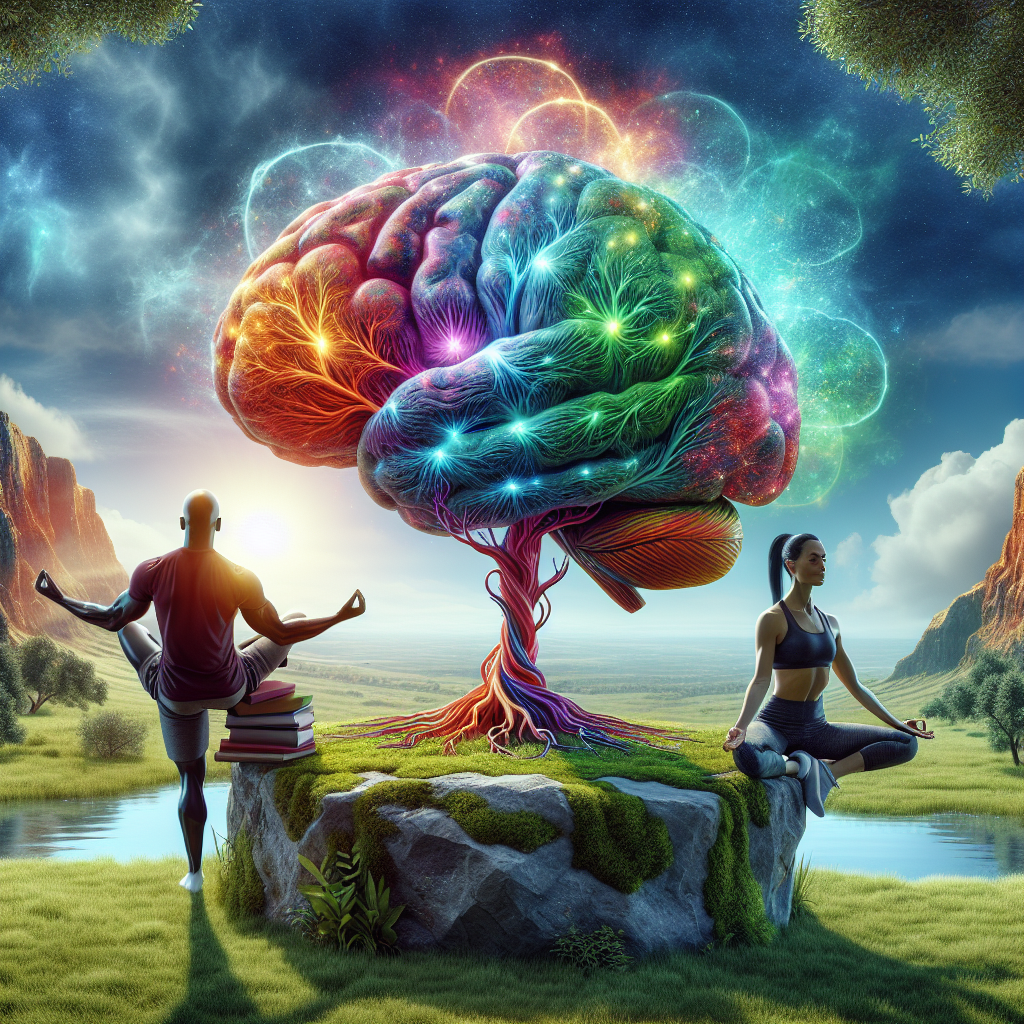
Key Takeaways: Why Your Mind Needs a Workout Too
- Mental fitness is crucial for emotional resilience and overall well-being.
- There’s a strong link between mental sharpness and physical health.
- Simple daily habits can significantly enhance your mental fitness.
- Positive thinking isn’t just a cliché; it’s a powerful mental tool.
- Mindfulness can transform the way you engage with the world around you.
Unlocking the Secrets of Mental Fitness
Just like muscles need exercise to grow stronger, your brain requires a workout to stay in shape. Mental fitness isn’t about how much you know; it’s about how well your mind can adapt, cope with stress, and overcome life’s hurdles. It’s the secret ingredient to a happier, more resilient you.
Defining Mental Fitness
Think of mental fitness as a state of well-being where you have the vigor and stamina to tackle intellectual challenges and emotional ups and downs. It’s not about never feeling down; it’s about bouncing back quicker when you do. Mental fitness means having the mental muscles to navigate life’s complexities with confidence.
The Connection Between Mental and Physical Health
Ever noticed how a brisk walk can clear your mind? That’s no coincidence. Your mental and physical health are two sides of the same coin, constantly influencing each other. When you take care of your body, your mind reaps the benefits, and when your mind is in top shape, it’s easier to maintain physical health.
Nurturing Your Mind: Simple Strategies
Improving your mental fitness doesn’t require a radical lifestyle overhaul. Small, consistent actions can lead to significant changes. Let’s explore some straightforward strategies to keep your mind sharp and resilient.
1. Daily Mindfulness Practices
Mindfulness is like a daily spa for your brain. It’s about being present in the moment and observing your thoughts without judgment. This practice can reduce stress, enhance focus, and even improve your relationships. Start with just five minutes a day, and watch the transformation unfold.
2. The Art of Positive Thinking
Positive thinking often gets mistaken for ignoring life’s problems. But in reality, it’s about approaching challenges with a proactive mindset. By focusing on solutions rather than dwelling on problems, you train your brain to be more resilient and open to possibilities.
3. Building Resilience to Stress
Stress is like weather; it’s always there, but you don’t have to get caught in the storm. Building resilience is about creating a sturdy umbrella to shield yourself. It’s learning to recognize stress triggers and having a set of coping strategies ready to deploy. Whether it’s deep breathing, a quick walk, or a chat with a friend, find what works for you and make it a habit.
The Balancing Act: Managing Work, Life, and Mind
Juggling work, life, and mental health is no small feat. It’s like keeping plates spinning on poles—focus too much on one, and the others may start to wobble. The key is finding equilibrium where all aspects of your life get the attention they deserve, including your mental well-being.
Setting Realistic Goals
Setting goals is like plotting a course on a map; it gives you direction and purpose. But if the destination is too far off the beaten path, it’s easy to get lost. Set achievable goals that challenge you without overwhelming you. Celebrate the small victories along the way—they add up to big successes.
Cultivating Work-Life Harmony
Harmony is not about perfect balance but about blending different aspects of life in a way that feels right for you. It’s recognizing when to push hard and when to ease off the gas. Sometimes work demands more, other times, life does. Listen to your needs and adjust accordingly.
From Good to Great: Enhancing Cognitive Abilities
Enhancing your cognitive abilities is like upgrading the software of your brain—it makes everything run smoother and more efficiently. It’s about sharpening your mind to improve memory, focus, and problem-solving skills. Let’s dive into some techniques to take your cognitive abilities from good to great.
Memory-Boosting Techniques
Improving memory can be as simple as changing up your routine. Try new activities, take different routes, or even eat with your non-dominant hand. These small changes can stimulate your brain and improve your memory. Remember, repetition is also key—practice recalling information to strengthen those mental muscles.
Creativity and Problem-Solving Exercises
Creativity and problem-solving are mental workouts that can be fun and rewarding. Try brain teasers, puzzles, or even video games that challenge your thinking. Engage in creative hobbies like drawing, writing, or music. Not only do these activities boost cognitive skills, but they also provide a sense of accomplishment and joy.
Measuring Progress: How to Know You’re Becoming Mentally Fit
Just like tracking your steps or monitoring your heart rate, measuring mental fitness is about noticing changes over time. It’s about recognizing when you handle stress better, solve problems faster, or simply feel more joyful and less anxious.
Tracking Mental Fitness: Tools and Techniques
To track your mental fitness, consider keeping a journal. Write down your feelings, the challenges you face, and how you deal with them. Apps that prompt mindfulness or cognitive exercises can also provide feedback on your progress. Even noting improvements in your sleep quality or daily interactions can be indicators of better mental fitness.
Setting and Achieving Mental Milestones
Setting mental milestones is about creating checkpoints on your journey to mental wellness. It might be mastering a new skill, improving your response to stress, or deepening relationships. When you reach these milestones, celebrate them—it reinforces your brain’s reward pathways and motivates you to keep going.
Building a Support System for Mental Fitness
No one is an island, and when it comes to mental fitness, the support of others can be your mainland. A strong support system provides encouragement, advice, and a different perspective when you’re too close to a problem to see the solution.
Seeking Professional Guidance
Professionals such as therapists or life coaches can be invaluable in your mental fitness journey. They can offer tailored strategies, support, and accountability. Don’t hesitate to seek out their guidance—it’s a sign of strength, not weakness.
Community and Social Networks
Surround yourself with people who uplift you. Join groups, whether in-person or online, that share your interest in mental fitness. These communities can provide inspiration, camaraderie, and a sense of belonging that fuels your mental well-being.
Fueling Your Brain: Nutrition and Mental Fitness
What you eat directly affects the structure and function of your brain. A nutritious diet supports mental fitness just as it does physical fitness. Think of food as fuel for your brain—choose high-quality, nutrient-rich options to keep it running smoothly.
- Omega-3 fatty acids from fish support brain cell membranes.
- Antioxidants in berries can protect your brain from oxidative stress.
- Complex carbohydrates from whole grains provide a steady energy supply.
- Leafy greens are rich in vitamins that help cognitive function.
- Nuts and seeds contain E vitamins that can help prevent cognitive decline.
- Probiotics in yogurt can improve your gut health, which is linked to brain health.
- Hydration is crucial; water is essential for delivering nutrients to the brain.
The Role of Diet in Mental Health
Your brain is a powerhouse that runs 24/7 and the food you eat is its energy source. Eating a balanced diet rich in essential nutrients can help regulate neurotransmitters and inflammatory processes, which in turn supports mental health. It’s not just about avoiding the sugar crash; it’s about fueling the complex functions that keep your mood, energy, and concentration in check.
Brain-Boosting Foods and Supplements
Some foods are like a turbo-boost for your brain. Fatty fish rich in omega-3 fatty acids, for instance, can support brain cell structure. Dark chocolate provides flavonoids, caffeine, and antioxidants. Nuts and seeds are a great source of vitamin E, which can help prevent cognitive decline. And don’t forget about supplements like B vitamins and magnesium that may support brain health. Remember, though, supplements are just that—a supplement to a healthy diet.
The Physical Fitness Connection: A Two-Way Street
Physical fitness and mental fitness are best friends—they go everywhere together. When you strengthen one, you often give a leg-up to the other. Regular physical activity can sharpen your wits, lift your mood, and even help you think more creatively. It’s a win-win situation.
Exercise as a Catalyst for Mental Wellness
Exercise releases endorphins, the body’s natural mood lifters. It also encourages the growth of new brain cells and connections. Think of it as a renovation project for your brain. Whether it’s a dance class, a jog, or a yoga session, moving your body can lead to a more vibrant mental state.
Mental Benefits of Regular Physical Activity
Regular physical activity doesn’t just build muscle; it builds mental fortitude. It can help manage stress, anxiety, and depressive symptoms. Exercise also boosts self-esteem and cognitive function, making it a key player in your mental fitness routine.
The Obstacle Course: Overcoming Mental Health Stigmas
Even in today’s enlightened age, mental health still battles stigma. These invisible barriers can make it hard for people to seek help or even acknowledge they’re struggling. But just as we’ve learned to talk openly about physical health, we can do the same for mental health.
Challenging Misconceptions
Many misconceptions about mental health come from a lack of understanding. Educating ourselves and others is crucial. Mental health issues are not a sign of weakness; they’re a part of the human experience. By talking about it, we can break down the walls of silence that often surround mental health challenges.
Spreading Awareness and Understanding
Creating a world that values mental fitness starts with spreading awareness. It’s about sharing stories, offering support, and educating each other on the importance of a healthy mind. When we talk openly about mental fitness, we empower others to take charge of their mental well-being and break the stigma that often surrounds mental health issues.
Frequently Asked Questions
- How do mental and physical fitness affect each other?
- What are some quick mental exercises I can do daily?
- How can I track my mental fitness progress?
- Can mental fitness help with managing emotions?
- What role do diet and sleep play in mental fitness?
How do mental and physical fitness affect each other?
Mental and physical fitness are intertwined. A healthy body can lead to a healthier mind, and vice versa. Regular physical activity can reduce symptoms of depression and anxiety, and improve mood and cognitive function. Similarly, a mentally fit mind can motivate and sustain physical fitness efforts.
What are some quick mental exercises I can do daily?
- Practice deep breathing for a few minutes to clear your mind.
- Engage in a short meditation or mindfulness session to focus your thoughts.
- Do a crossword puzzle or Sudoku to sharpen your cognitive skills.
- Take a different route to work or try a new recipe to challenge your brain.
- Spend a few moments practicing gratitude to boost your mood.
How can I track my mental fitness progress?
Tracking your mental fitness can be as simple as reflecting on your day each evening. Consider questions like: Did I handle stress well today? Was I able to focus? How did I feel overall? You can also use apps that track mood and habits, or even note your progress in a journal.
Can mental fitness help with managing emotions?
Yes, mental fitness is key to managing emotions. By building mental strength, you can better understand and regulate your feelings, respond rather than react to emotional triggers, and develop coping strategies that lead to a more balanced emotional life.
What role do diet and sleep play in mental fitness?
A balanced diet provides the nutrients your brain needs to function optimally, while sleep is crucial for consolidating memories and processing emotions. Together, they lay the foundation for a fit and healthy mind.
In conclusion, mental fitness is a vital aspect of our overall health that deserves as much attention and care as physical fitness. By integrating simple mental exercises into our daily routine, fostering positive thinking, and maintaining a healthy lifestyle, we can significantly enhance our mental well-being. Remember, a strong mind leads to a strong life, and it’s never too late to start working out your mental muscles. So, let’s prioritize our mental fitness and inspire wellness in ourselves and those around us. Together, we can create a world where mental fitness is recognized, valued, and celebrated.


